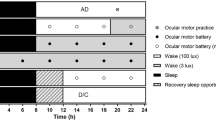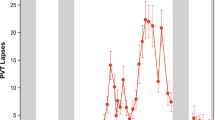Abstract
The Attentional Blink (AB) is a phenomenon that reflects difficulty in detecting or identifying the second of two successive targets (T1 and T2) that are presented in rapid succession, between 200-500ms apart. The AB involves indicators of attentional and temporal integration mechanisms related to the early stages of visual processing. The aim of this study was to identify the effects of 24-h of sleep deprivation (total sleep deprivation, TSD) on the attentional and temporal integration mechanisms of the AB. Twenty-two undergraduate students were recorded during five successive days, in these three conditions: baseline (two days), TSD (one day), and recovery (two days). Each day, at around 12:00 h, participants responded to a Rapid Serial Visual Presentation task (RSVP) that presented two targets separated by random intervals from 100 to 1000ms. The attentional mechanisms were assessed by the AB presence, the AB magnitude, and the AB interval, while the temporal integration mechanisms were evaluated by lag-1 sparing and order reversal responses. TSD negatively affected the attentional mechanisms, which is expressed by an overall reduction in performance, an extended AB interval, and a reduced AB magnitude. TSD also negatively affected the temporal integration mechanisms, manifested by an absence of lag-1 sparing and an increase in order reversals. These results suggest that people are still able to respond to two successive stimuli after 24 h without sleep. However, it becomes more difficult to respond to both stimuli because the attentional and temporal integration mechanisms of the AB are impaired.



Similar content being viewed by others
Data availability
The datasets analyzed during the current study are available from the corresponding author upon reasonable request.
References
Adler RF, Benbunan-Fich R (2015) The effects of task difficulty and multitasking on performance. Interact Comput 27(4):430–439. https://doi.org/10.1093/iwc/iwu005
Aernout E, Benradia I, Hazo JB, Sy A, Askevis-Leherpeux F, Sebbane D, Roelandt JL (2021) International study of the prevalence and factors associated with insomnia in the general population. Sleep Med 82:186–192. https://doi.org/10.1016/j.sleep.2021.03.028
Akyürek EG, Hommel B (2005) Target integration and the attentional blink. Acta Psychol 119(3):305–314. https://doi.org/10.1016/j.actpsy.2005.02.006
Akyürek EG, Wolff MJ (2016) Extended temporal integration in rapid serial visual presentation: attentional control at lag 1 and beyond. Acta Psychol 168:50–64. https://doi.org/10.1016/j.actpsy.2016.04.009
Akyürek EG, Eshuis SA, Nieuwenstein MR, Saija JD, Başkent D, Hommel B (2012) Temporal target integration underlies performance at lag 1 in the attentional blink. J Exp Psychol Hum Percept Perform 38(6):1448–1464. https://doi.org/10.1037/a0027610
Alhola P, Polo-Kantola P (2007) Sleep deprivation: impact on cognitive performance. Neuropsychiatr Dis Treat 3(5):553–567. https://doi.org/10.2147/ndt.s12160203
Alkahtani M, Ahmad A, Darmoul S, Samman S, Al-zabidi A, Matraf KB (2016) Multitasking trends and impact on education: a literature review. Int J Educ Pedagog Sci 10(3):1006–1012. https://doi.org/10.5281/zenodo.1124643
Band GP, Jolicœur P, Akyürek EG, Memelink J (2006) Integrative views on dual-task costs. Eur J Cogn Psychol 18(4):481–492. https://doi.org/10.1080/09541440500422675
Broadbent DE, Broadbent MH (1987) From detection to identification: response to multiple targets in rapid serial visual presentation. Percept Psychophys 42(2):105–113. https://doi.org/10.3758/bf03210498
Chun MM, Potter MC (1995) A two-stage model for multiple target detection in rapid serial visual presentation. J Exp Psychol Hum Percept Perform 21(1):109–127. https://doi.org/10.1037/0096-1523.21.1.109
Cluydts R, De Valck E, Verstraeten E, Theys P (2002) Daytime sleepiness and its evaluation. Sleep Med Rev 6(2):83–96. https://doi.org/10.1053/smrv.2002.0191
Dux PE, Marois R (2009) The attentional blink: a review of data and theory. Atten Percept Psychophys 71(8):1683–1700. https://doi.org/10.3758/APP.71.8.1683
Enns JT, Kealong P, Tichon JG, Visser TA (2017) Training and the attentional blink: raising the ceiling does not remove the limits. Atten Percept Psychophys 79:2257–2274. https://doi.org/10.3758/s13414-017-1391-9
Faul F, Erdfelder E, Lang A-G, Buchner A (2007) G*Power 3: a flexible statistical power analysis program for the social, behavioral, and biomedical sciences. Behav Res Methods 39:175–191
Gallegos C, García A, Ramírez C, Borrani J, Azevedo CVM, Valdez P (2019) Circadian and homeostatic modulation of the attentional blink. Chronobiol Int 36(3):343–352. https://doi.org/10.1080/07420528.2018.1543315
García A, Del Angel J, Borrani J, Ramirez C, Valdez P (2021) Sleep deprivation effects on basic cognitive processes: which components of attention, working memory, and executive functions are more susceptible to the lack of sleep? Sleep Sci 14(2):107–118. https://doi.org/10.5935/1984-0063.20200049
Goel N, Rao H, Durmer JS, Dinges DF (2009) Neurocognitive consequences of sleep deprivation. Semin Neurol 29(4):320–339. https://doi.org/10.1055/s-0029-1237117
Hollingsworth DE, McAuliffe SP, Knowlton BJ (2001) Temporal allocation of visual attention in adult attention deficit hyperactivity disorder. J Cogn Neurosci 13(3):298–305. https://doi.org/10.1162/08989290151137359
Hommel B, Akyürek EG (2005) Lag-1 sparing in the attentional blink: benefits and costs of integrating two events into a single episode. Q J Exp Psychol 58(8):1415–1433. https://doi.org/10.1080/02724980443000647
Horne JA, Östberg O (1976) A self-assessment questionnaire to determine morningness-eveningness in human circadian rhythms. Int J Cronobiol 4:97–110
Husain M, Rorden C (2003) Non-spatially lateralized mechanisms in hemispatial neglect. Nat Rev Neurosci 4(1):26–36. https://doi.org/10.1038/nrn1005
Husain M, Shapiro K, Martin J, Kennard C (1997) Abnormal temporal dynamics of visual attention in spatial neglect patients. Nature 385(6612):154–156. https://doi.org/10.1038/385154a0
Jarvis BG (2008) DirectRT (Version 2008.1.0.13) [Computer Software]. Empirisoft Corporation, New York, NY
Killgore WD (2010) Effects of sleep deprivation on cognition. Prog Brain Res 185:105–129. https://doi.org/10.1016/b978-0-444-53702-7.00007-5
Kong D, Soon CS, Chee MW (2011) Reduced visual processing capacity in sleep deprived persons. NeuroImage 55(2):629–634. https://doi.org/10.1016/j.neuroimage.2010.12.057
Kong D, Asplund CL, Chee MW (2014) Sleep deprivation reduces the rate of rapid picture processing. NeuroImage 91:169–176. https://doi.org/10.1016/j.neuroimage.2014.01.037
Li CSR, Lin WH, Yang YY, Huang CC, Chen TW, Chen YC (2002) Impairment of temporal attention in patients with schizophrenia. NeuroReport 13(11):1427–1430. https://doi.org/10.1097/00001756-200208070-00016
MacLean, MH, Arnell KM (2011) Greater attentional blink magnitude is associated with higher levels of anticipatory attention as measured by alpha event-related desynchronization (ERD). Brain Res 1387:99–107. https://doi.org/10.1016/j.brainres.2011.02.069
MacLean MH, Arnell KM (2012) A conceptual and methodological framework for measuring and modulating the attentional blink. Atten Percept Psychophys 74(6):1080–1097. https://doi.org/10.3758/s13414-012-0338-4
Martens S, Wyble B (2010) The attentional blink: past, present, and future of a blind spot in perceptual awareness. Neurosci Biobehav Rev 34(6):947–957. https://doi.org/10.1016/j.neubiorev.2009.12.005
Monk TH, Reynolds CF, Kupfer DJ, Buysse DJ, Coble PA, Hayes AJ, MacHen MA, Petrie SR, Ritenour AM (1994) The Pittsburgh Sleep Diary. J Sleep Res 3:111–120. https://doi.org/10.1111/j.1365-2869.1994.tb00114.x
Olivers CN, Van Der Stigchel S, Hullema J (2007) Spreading the sparing: against a limited-capacity account of the attentional blink. Psychol Res 71:126–139. https://doi.org/10.1007/s00426-005-0029-z
Pashler H (1994) Dual-Task interference in simple tasks: data and theory. Psychol Bull 116(2):220–244. https://doi.org/10.1037/0033-2909.116.2.220
Potter MC, Chun MM, Banks BS, Muckenhoupt M (1998) Two attentional deficits in serial target search: the visual attentional blink and an amodal task-switch deficit. J Exp Psychol Learn Mem Cogn 24(4):979–992. https://doi.org/10.1037/0278-7393.24.4.979
Raymond JE, Shapiro KL, Arnell KM (1992) Temporary suppression of visual processing in an RSVP task: an attentional blink? J Exp Psychol Hum Percept Perform 18(3):849–860. https://doi.org/10.1038/385154a0
Şen B, Kurtaran NE, Öztürk L (2023) The effect of 24-hour sleep deprivation on subjective time perception. Int J Psychophysiol 192:91–97. https://doi.org/10.1016/j.ijpsycho.2023.08.011
Shenfield L, Beanland V, Filtness A, Apthorp D (2020) The impact of sleep loss on sustained and transient attention: an EEG study. PeerJ 8:e8960. https://doi.org/10.7717/peerj.8960
Tassi P, Muzet A (2000) Sleep inertia. Sleep Med Rev 4(4):341–353. https://doi.org/10.1053/smrv.2000.0098
Valdez P (2019) Homeostatic and circadian regulation of cognitive performance. Biol Rhythm Res 50(1):85–93. https://doi.org/10.1080/09291016.2018.1491271
Valdez P, Ramírez C, García A (1996) Delaying and extending sleep during weekends: Sleep Recovery or Circadian Effect? Chronobiol Int 13(3):191–198. https://doi.org/10.3109/07420529609012652
Valdez P, Ramírez C, Téllez A (1998) Alteraciones del ciclo dormir-vigilia [Sleep-wake cycle disorders]. In: Téllez (ed) Trastornos del sueño: diagnóstico y tratamiento [Sleep disorders: diagnosis and treatment] Trillas, Mexico City, pp 193–230
Visser TA, Ohan JL (2011) Is all sparing created equal? Comparing lag-1 sparing and extended sparing in temporal object perception. J Exp Psychol Hum Percept Perform 37(5):1527–1541. https://doi.org/10.1037/a0023508
Visser TA, Bischof WF, Di Lollo V (1999) Attentional switching in spatial and nonspatial domains: evidence from the attentional blink. Psychol Bull 125(4):458–469. https://doi.org/10.1037/0033-2909.125.4.458
Willems C, Wierda SM, van Viegen E, Martens S (2013) Correction: individual differences in the attentional blink: the temporal Profile of blinkers and non-blinkers. PLoS ONE 8(12). https://doi.org/10.1371/annotation/222971f5-0ce8-4776-943d-b2854a3836eb
World Medical Association (2001) World Medical Association Declaration of Helsinki. Ethical principles for medical research involving human subjects. Bull World Health Organ 79(4):373–374
Funding
No funding was received for conducting this study.
Author information
Authors and Affiliations
Contributions
All authors contributed to the study conception and design. Material preparation, data collection, and analysis were performed by all authors. The first draft of the manuscript was written by Carlos Gallegos. The preliminary versions of the manuscript were commented on by all authors. The final manuscript was read and approved by all authors.
Corresponding author
Ethics declarations
Code availability
Not applicable.
Ethical approval
This study was approved by an academic committee at the University and was carried out in accordance with the principles of the Declaration of Helsinki.
Consent to participate
Each participant of the study signed an informed consent letter, and another signed letter was required from parents of minors.
Conflict of interest
The authors declare that they have no conflict of interest.
Additional information
Communicated by Winston D Byblow
Publisher’s Note
Springer Nature remains neutral with regard to jurisdictional claims in published maps and institutional affiliations.
Rights and permissions
Springer Nature or its licensor (e.g. a society or other partner) holds exclusive rights to this article under a publishing agreement with the author(s) or other rightsholder(s); author self-archiving of the accepted manuscript version of this article is solely governed by the terms of such publishing agreement and applicable law.
About this article
Cite this article
Gallegos, C., Ramírez, C., García, A. et al. Total sleep deprivation effects on the attentional blink. Exp Brain Res (2024). https://doi.org/10.1007/s00221-024-06826-7
Received:
Accepted:
Published:
DOI: https://doi.org/10.1007/s00221-024-06826-7




